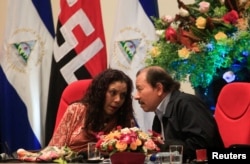The State Department has ordered the departure of U.S. government family members and authorized the departure of U.S. personnel from Nicaragua, in the wake of recent deadly protests there.
"Political rallies and demonstrations are occurring daily, often with little notice or predictability. Some protests result in injuries and deaths," said an updated travel advisory issued by the State Department. "Demonstrations typically elicit a strong response that has in the past included the use of tear gas, pepper spray, rubber bullets, and live ammunition against participants, and occasionally have devolved into looting, vandalism and acts of arson.”
Nicaraguan President Daniel Ortega's announcement last week of changes to the country's pension plan sparked days of deadly protests. On Sunday, he said he has scrapped those plans.
The president said the plan to increase worker contributions to social security and to lower pensions was being "revoked, cancelled, put aside." He added, "We cannot allow chaos, crime and looting."
Officials said Friday at least 10 people had died in the protests.
Some rights groups estimate the death toll since Wednesday, when the demonstrations began, is as high as 25, including a journalist reporting live via Facebook.
But an American educator working in Nicaragua said that as many as 30 people are reported to have been killed.
Monica Lovely, executive director of the non-profit Education Plus Nicaragua, said in an email to supporters that while the pension plan might have sparked the protests, they have also been fueled by anger about the government's handling of natural disasters and the poor state of education.
WATCH: Nicaragua unrest
Late Saturday, journalist Angel Gahona was covering the protests live on Facebook from Bluefields, a town on Nicaragua's Caribbean coast, when he was shot and killed. In the footage that has circulated widely on social media, gunfire is heard, Gahona falls down, and several voices call out to him.
President Ortega is a former guerilla soldier. His vice president is his wife, Rosario Murillo.
A court decision allowed Ortega to run for re-election in 2011, even though the country had a one-term limit. Three years after that, his leftist Sandinista National Liberation Front (FSLN) Party gained enough support in congress for a constitutional amendment to allow unlimited presidential terms.
VOA's Cindy Saine contributed to this report.








